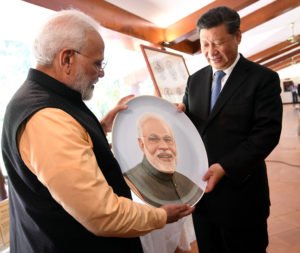SJM-RSS pressure on Modi Govt

The Regional Comprehensive Economic Partnership (RCEP) – a proposed FTA between the 10 member states of the ASEAN and six of its dialogue partners – is unmistakably the flavor of the season in India. Three connected occasions point to the priority of the RCEP, not just for the Indian government, but also for industry and several other domestic stakeholders.
The first of the three occasions was the meeting of trade ministers of the RCEP negotiating countries that began in Bangkok from 12 October 2019. Many are hoping this would be the last ministerial meeting before the conclusion of the RCEP talks at the forthcoming ASEAN Summit in November.
All eyes are on India, and whether it agrees to ‘play ball’ for drawing the RCEP to a close, writes Dr Amitendu Palit, a Senior Research Fellow and Research Lead (Trade and Economic Policy) at the Institute of
South Asian Studies (ISAS)
(The paper was first published by ISAS, an autonomous research institute at the National University of Singapore).
For India, though, much depends on what it is offered bilaterally, in terms of commitments on greater market access by China. This featured in the second connected occasion on the RCEP through the informal Summit between Indian Prime Minister Narendra Modi and Chinese President Xi Jinping at Mamallapuram, Chennai, from 11-12 October 2019.
The Chinese commitment to work with India for reducing the bilateral trade deficit, which is one of the biggest reservations India has on the RCEP, might have been just what India was looking for.
The third occasion relating to the RCEP reflects the difficulty the government is facing at home in agreeing to the deal. The Swadeshi Jagran Manch (SJM), an economic group affiliated to the influential Rashtriya Swayamsevak Sangh (RSS), has launched nationwide protests from 10 October 2019, against India’s efforts to join the RCEP.
The arguments floated by SJM are familiar: apprehensions over deluge of cheap imports from China and Southeast Asia, and large global MNCs strengthening their grip over the Indian economy through regional value chains that they run and manage. Rarely does domestic opposition to trade agreements reach a level, as it has in India on the RCEP.
The challenge for the Modi government is huge. On one hand, it is conscious of the importance of being in the RCEP. Whatever the fears on imports, economically, India is likely to face isolation if it opts out. The same value chains that are being castigated by domestic protest groups, are India’s hope for drawing in private investments in manufacturing and services, if they run through India. They are the way forward in generating at least some new jobs in local industry.
Giving up on the RCEP means considerable loss of geopolitical goodwill for India. India’s hopes of being heard seriously in regional and global affairs would receive a rude jolt if it opts out of the economic order symbolized by the RCEP that is looking to bind Southeast Asia, East Asia, Oceania and India, through common trade and investment rules.
Abandoning the RCEP would mean severely damaging India’s credibility in working with multilateral and regional arrangements. It might, in the foreseeable future, hurt India’s efforts to project itself as a global leader in major initiatives like sustainable development and climate change. It would also inflict considerable harm on India’s prospects of spearheading cross-regional initiatives like the BIMSTEC (Bay of Bengal Initiative for Multi-Sectoral Technical and Economic Cooperation).
All these concerns are compounded by the fact that disengaging from the RCEP would mean ceding considerable strategic turf to China in the region. It would be tantamount to doing what the Trump Administration did by taking the US out of the Trans-Pacific Partnership (TPP).
The costs of not being in the RCEP are high and nearly non-negotiable. But the Indian government also cannot afford to overlook the costs of joining the RCEP. Antagonizing the RSS and its affiliates has long-term implications for the ruling BJP. This is not just because of the deep links that senior BJP leaders and current cabinet ministers, including Prime Minister Modi, have with the RSS. It is also the enormously important role that the RSS and its affiliate groups have played in making the BJP what it is today: India’s most powerful political party, enjoying vastly popular mandates at the Centre and states, enabling it to implement political, economic and social agendas in an almost unchallenged fashion.
For getting into the RCEP, the Modi government, ironically, might have to employ the robust mandate and political authority it enjoys, for overlooking protests of several constituencies responsible for securing the mandate and resultant clout. The choice is difficult and the costs need to be managed carefully during the rest of the government’s term.
The RCEP is a legacy that the Modi government inherited. Over time, it has come to understand the value of this legacy. But it is also experiencing the pains of inheritance. The RCEP has literally brought the government to the crossroads. It is a rare situation, where the Modi-government is terribly hard-pressed for locating ‘win-win’ outcomes. fiinews.com










